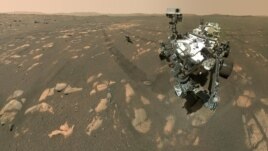16 July 2023
Scientists say they have found new evidence of organic matter on Mars that could be linked to past life on the planet.
The Perseverance explorer, which is operated by the American space agency NASA, discovered the organic materials. The explorer, or rover, has been collecting data on Mars since landing on the Red Planet in February 2021.
The goal, or mission, of Perseverance is to collect Martian soil and rock material as part of a search for signs of ancient life. Scientists on Earth using the equipment on the rover examine this material as closely as possible. The collected soil and rocks are to be picked up in future missions and returned to Earth for examination.

This April 6, 2021 image made available by NASA shows the Perseverance Mars rover, foreground, and the Ingenuity helicopter about 3.9 meters behind. This composite image was made by the WASTON camera on the rover's robotic arm. (NASA/JPL-Caltech/MSSS via AP)
Researchers said the latest findings suggest the presence on the Martian surface of the same kinds of carbon "signals" that are linked to living organisms on Earth. The presence of carbon may suggest that biological life once existed on Mars. But the carbon material could also be related to nonbiological processes.
In the past, data from two other NASA explorers – the Phoenix lander and the Curiosity rover – found evidence of organic carbon on the surface of Mars. But both of those discoveries were made with gas-based methods used for examining organic matter. The latest findings were made through a different method.
This time, the research team used an instrument attached to Perseverance's robotic arm known as SHERLOC. It uses cameras, spectrometers and a laser to search for organic matter and minerals, NASA said. The instrument centers on materials that might have been changed by watery environments and could provide biological evidence of past life.
One of the leaders of the latest research was Amy Williams, an astrobiologist and assistant professor at the University of Florida. She was one of the writers of a study that describes the latest findings in the publication Nature. The study suggests the new research method provided evidence "of a more intricate organic geochemical cycle on Mars than previously understood."
Williams works on the Perseverance mission team. She said in a statement that the SHERLOC instrument appears to have observed several kinds of organic carbon matter. She added that the discovery "has implications for understanding the carbon cycle on Mars," as well as the possibility that the planet once supported life.
Williams said SHERLOC was very effective at mapping the positions of organic molecules and minerals on rock surfaces around an area of Mars called Jezero Crater.
Ashley Murphy was another writer of the study. She is a research scientist at the Planetary Science Institute in Arizona. Murphy said the SHERLOC instrument produces "the spatial resolution needed to observe important mineral-organic relationships" to study possible biological signals.
"The big takeaway here is, with SHERLOC's grain-by-grain resolution we can finally observe variation in organic preservation within the rocks on Mars," Murphy said. She added, "This is also one of the first reports of (possible) organics in Jezero Crater."
Scientists believe Jezero Crater contains the remains of an ancient river system. NASA considers the area a good place to look for possible signs of past life. Scientists believe if life ever existed on Mars, it would have been present 3 to 4 billion years ago, when water flowed freely on the planet.
Williams suggested the latest findings mark important progress in the search for signs of ancient life forms on Mars. "We are just now scratching the surface of the organic carbon story on Mars, and it is an exciting time for planetary science."
I'm Bryan Lynn.
Bryan Lynn wrote this story for VOA Learning English, based on reports from the University of Florida, Nature, the Planetary Science Institute and NASA.
___________________________________________________________________
Words in This Story
spectrometer – n. an instrument that measures levels of chemical elements and gases in the Martian atmosphere
intricate –adj. having fine detail or made of many parts
imply – v. to suggest or show something, without saying it directly
spatial – adj. relating to the position, area and size for things
resolution – n. a measure of the sharpness of an image or the fineness a device operates at
takeaway –n. a fact or idea that comes from a discussion or meeting
variation – n. a difference in amount or quality
scratch the surface – idiom. to deal with only a small part of a problem or subject